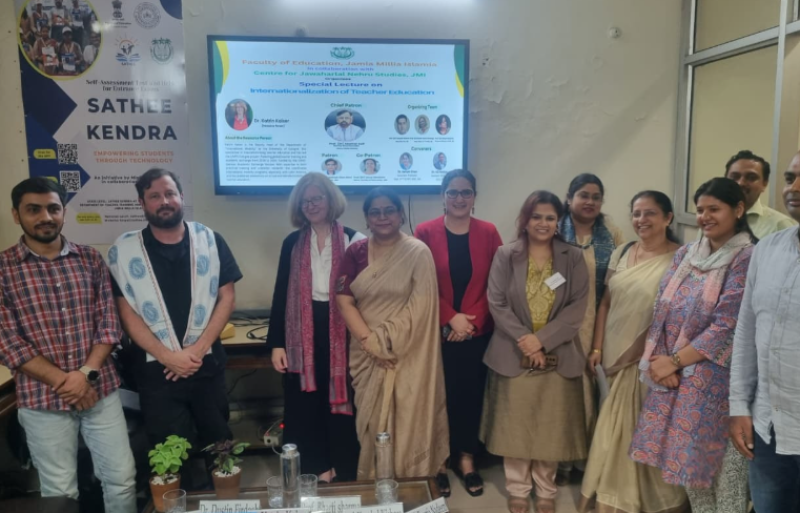The Faculty of Education, Jamia Millia Islamia, in collaboration with the Centre for Jawaharlal Nehru Studies (CJNS),JMI, organised a distinguished lecture and experiential session on 3rd October, 2025 at the Computer Laboratory, Department of Teacher Training and Non-Formal Education (IASE), JMI. The event brought together eminent scholars, faculty members, and students for an engaging academic discourse with theoretical perspectives.
The programme commenced with a soulful recitation from the Holy Quran by Mr. Mohd Asif, followed by the rendition of the Jamia Tarana, which set a reflective and unifying atmosphere. The welcome address was delivered by Prof. Jessy Abraham, Dean, Faculty of Education, who emphasised the significance of global perspectives and innovative pedagogical practices in teacher education. She also expressed her gratitude to the convenors, the Heads of both departments, and the Hon’ble Vice-Chancellor for their continued support. This was followed by an address from Prof. Bharti Sharma, Hony. Director, CJNS, who underlined the growing need to contextualise teacher education within a global framework. She elaborated on the diverse components of the programme — including lectures, practical aspects, internships, and cultural engagements — all of which would benefit the participants. She also introduced the upcoming session “Computational Thinking and the Nature of Science: From Apes to AI”, linking psychology and science, and sparking excitement for the audience.
The distinguished guests were then felicitated by Prof. Syedah Fawzia Nadeem, Officiating Head, Department of TT & NFE, and Prof. Kaushal Kishor, Department of Educational Studies. They were honoured with an hand printed Angwastra (specially printed by Dr. Nazneen Fatima from Department of Teacher Training and Non-Formal Education), three books published by the Department of Teacher Training and Non-Formal Education, and a sapling, symbolising tradition, knowledge, and sustainability.
Dr. Aerum Khan formally introduced the invited speakers, Dr. Katrin Kaiser and Dr. Dustin Eirdosh highlighting their academic excellence and research contributions. The academic proceedings began with an enlightening lecture by Dr. Katrin Kaiser Deputy Head of the Department of International Mobility at the University of Cologne, Germany on “Internationalization of Teacher Education.” She introduced herself and extended thanks to the Hon’ble Vice-Chancellor, JMI, the Registrar, JMI; Prof. Bharti Sharma, the Dean, Prof. Jessy Abraham and the organizing team. Dr. Kaiser highlighted the international ranking of the University of Cologne and its strategic focus on teacher education. She elaborated on initiatives such as UNITE Cologne, diverse subject combinations, global internships, and practical phases at both B.A. and M.A. levels, all of which integrate intercultural competence, digital learning, and hands-on training. She also shared how student voices reflect the enriching impact of international exposure and personal growth at the University of Cologne. Stressing the need for global networking, cultural responsiveness, and exchange of best practices, Dr. Kaiser encouraged participants to reflect on ways of embedding global perspectives within the Indian education system.
The next session was conducted by Dr. Dustin Eirdosh, Education Innovation Coordinator and Postdoctoral Researcher, Max Planck Institute for Evolutionary Anthropology, Leipzig. His experiential lecture on “Computational Thinking and the Nature of Science: From Apes to AI” engaged participants in exploring the evolution of human cognition, scientific inquiry, and computational models. He emphasized that science is a human endeavor of creating models to explain and predict phenomena. The session traced the journey of science from human evolution to Artificial Intelligence, presenting AI as a model that processes data but lacks human ethics and judgment. While AI holds immense potential in education and decision-making, it also poses social dilemmas such as inequality, surveillance, and job displacement. Dr. Eirdosh highlighted the importance of ethical responsibility, inclusivity, and critical thinking in using AI, and concluded that “the scientist creates the model — not the other way around.” His session effectively demonstrated how computational thinking and AI approaches can be integrated into classrooms to nurture creativity, problem-solving, and innovation among students.
The programme concluded with a vote of thanks delivered by Dr. Ali Haider, who expressed gratitude to the speakers, organisers, and participants for making the event a success.
The collaboration between the Faculty of Education and CJNS once again reaffirmed Jamia Millia Islamia’s commitment to interdisciplinary dialogue, international collaboration, and advancing educational practices that prepare future educators for a rapidly evolving global society. The programme was convened by Dr. Aerum Khan, Associate Professor of Science Education, Department of TT & NFE (IASE) and Dr. Ali Haider, Assistant Professor, Department of Educational Studies, Faculty of Education, JMI.


